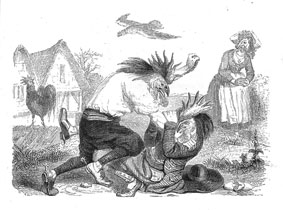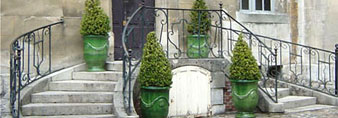THE TWO COCKS (VII, 13)
Two cocks had lived in peace, till from afar
A hen came in, and kindled up a war.
0 love! thou wert the curse of Troy ;
By thee were troubled the abodes of joy,
Where strife arose, and god opposed to god,
Till Xanthus flowed with their celestial blood.
Long time the cocks maintained the fight,
The noise of which spread everywhere around ;
The crested tribes came flocking to the sight.
Many a Helen plumed the victor crowned ;
The vanquished hero blushing fled
To his retreat to hide his head—
There wept his honour and his mistress lost ;
Hearing his happy rival boast
His mistress lost and in his rival's power,
Which he must see and suffer every hour !
The sight his courage kindled into rage ;
His beak and claws he whetted to engage,
And flapped his sides, and fought the air,
In his excess of wild despair,
Burning with jealous wrath to bleed,
For which at last there was no need.
The victor cock sat perched on high,
Proudly chanting victory.
A vulture heard him as he crew—
To all his gallantry adieu.
His pride was crushed beneath the vulture's claws,
And thus by fortune's unexpected laws,
Behold, the rival cock again
Come back to gallant with the hen.
I leave to guess what tattling lives ;
For there he found a mob of wives.
Thus Fortune lays the fatal snare :
The haughty victor seeks to be undone.
Then Fate distrust—be humble, and take care
After the victory is won. |
 |
J.J. Grandville
|
THE INGRATITUDE AND INJUSTICE OF MEN
TOWARDS FORTUNE (VII, 14)
A lucky merchant prospered on the waves,
Through many a course the stormy deep he braves ;
No gulfs, nor banks, nor rocks required their fee
Of bales thrown out—by Fate from all made free.
His fellow-traders all the tribute pay
To Atropus and Neptune's gloomy sway ;
While Fortune safely steered him home again.
Faithful his partners, agents, clerks remain ;
Well sold they his tobacco, sugar, spice,
His china, and his Carolina rice.
Folly and pride on him abundance poured—
Riches, in fine, upon his coffers showered.
Of double ducats only talked his guests ;
Himself of horses, carriages, and hounds.
His fasting days were splendid marriage-feasts.
“ How ! " cried a friend, " here's pleasure without bounds :
Whence had you all this pomp and sumptuous fare ? ”
“ Whence, but from my own knowledge and my care ?
All this to me from skill and talents fell :
I risked with caution—placed my money well.”
So great his profits, and so pleased was he,
He risked again, and sent his wealth to sea.
But lo ! at last his schemes went all amiss—
His own imprudence was the cause of this.
One ship, not well equipped, was cast away ;
Another, badly mounted for the fight,
To pirates fell an easy prey ;
A third arrived too late to bless his sight—
Its market was no more : folly and pride
Were running down a different tide.
Having been robbed by clerks, in short,
And robbing too himself by sport,
Squandering on feasts, on buildings more,
Behold him suddenly got poor.
His friend perceived him in a shabby state :
“ Whence the sad change ? ” he asked.—“ Alas ! from Fate.”
“ Cheer up,” he cried, “ and Fortune's lesson prize ;
Since she has left you, study to be wise.”
I know not if he took the good advice ;
But all in such a case, with swelling fit,
Their happiness ascribe to their own wit ;
And if their follies meet a check severe,
Fortune must their invectives hear ;
Nothing so common to our ear :
The good, why theirs—to Fortune ills belong ;
They're always right, and Fate is always wrong.
|
|
THE FEMALE FORTUNE-TELLERS (VII, 15)
From chance opinion often springs,
Again opinion fashion ever brings.
This maxim mortals prove in every state ;
’Tis prejudice, cabal, both obstinate ;
Justice but little has, if any, weight.
It is a torrent—what is to be done ?
It must as heretofore for ever run.
A dame in Paris Pythonissa played,
On each event to her they visits paid,
A lover absent, or a rag mislaid,
A husband fonder than was fit of life,
An angry mother, or a jealous wife,
All to the fortune-teller went,
Announced their wishes or distress.
Her art consisted in address,
In cunning, impudence, and cant,
And sometimes chance—all these her turn supplied ;
Often from these a miracle they cried.
In fact, though blind and stupid as an ass,
She for a very oracle did pass.
The oracle lodged next the sky ;
There the wise lady fill'd her purse ;
And though she had no other source,
In time she gained enough to buy
Her husband, rank, and place, and house, and fame.
The garret after lodged another dame,
To whom all Paris flocked the same ;
Men,- maids, and valets, small and great,
All came to read the book of Fate.
Such custom had the former lady brought,
The attic room a Sybil’s cave was thought.
In vain her ignorance the latter pleads :
“ What ! I divine ! good folks, you laugh at me,
I hardly know my A B C.”
No reasoning heard—predict she must and needs ;
Spite of herself must heaps of money gain,
More than two lawyers could with all their brain.
Much helped the furniture of Goody's room,
Four broken chairs and handle of a broom :
All showed a witch from some grimalkin sprung.
Had she spoke truth in rooms with splendour hung,
They would have laughed at her and thought her wrong.
The vogue was changed—the garret brought the gain,
The other lady stayed at home in vain.
The sign brings customers again.
I've seen a robe in court hung awkward on,
A crowd of listening clients' pockets drain,
Taken for Master Such a One,
Who ever wore his gown awry.
Reader, I ask the reason why ? |
|
THE CAT, WEASEL, AND YOUNG RABBIT
(VII, 16)
Onemorn, while young John Rabbit went abroad,
Dame Weasel seized the hall where he abode ;
A trick not very hard to play.
Thither she moved her household gods one day,
While he went forth to hail the dawn,
And sport along the flowery dewy lawn.
Long John remained to trot, and browse, and roam,
At last he sought his subterraneous home.
The weasel at the window showed her snout :
“ Ye household gods ! what do I here behold ? ”
Cried Jack, from his Penates driven out ;
“ Holla! my Lady Weasel bold,
Dislodge without the trumpet's sound,
Or I'll proclaim you to the rats around.”
The dame with nose so sharp replied :
“ The earth is his by whom first occupied.
A pretty cause for war is feign'd ;
A house himself by creeping only gained !
But if a kingdom were to be obtained,
I wish to know what law,” she said,
“ The grant of that for ever made
To John, nephew or son of James or Saul,
Rather than to me—rather than to Paul.”
John Rabbit pleaded custom out of mind ;
“ Which law,” he said, “ the house to me assigned,
Master and lord—passed down from sire to son,
Through George and Richard—then to me, called John.
Is yours a wiser law, first corner, pray ? ”
“ Well,” cried she, “ no more wrangling or delay ;
Let old Grimalkin for us settle that.
He lived a pious hermit of a cat—
A cat with meek inviting face,
Swelled in his reverend ermine sleek and fat,
A judge expert in every case.”
To this Jack Rabbit straight agreed—
Behold them both arrived to plead
Before his ermine majesty.
“ My children,” Gripinal exclaimed, “ draw nigh,
Approach, for I've been deaf this many a year.”
They both approach him without fear.
Soon as the clients in his reach he saw,
The good old father Gripinal first groans,
Then threw to right and left a ready claw,
And reconciled them, cracking both their bones.
A strong resemblance in these wrangling things,
Of little sovereigns who refer to kings. |
|



